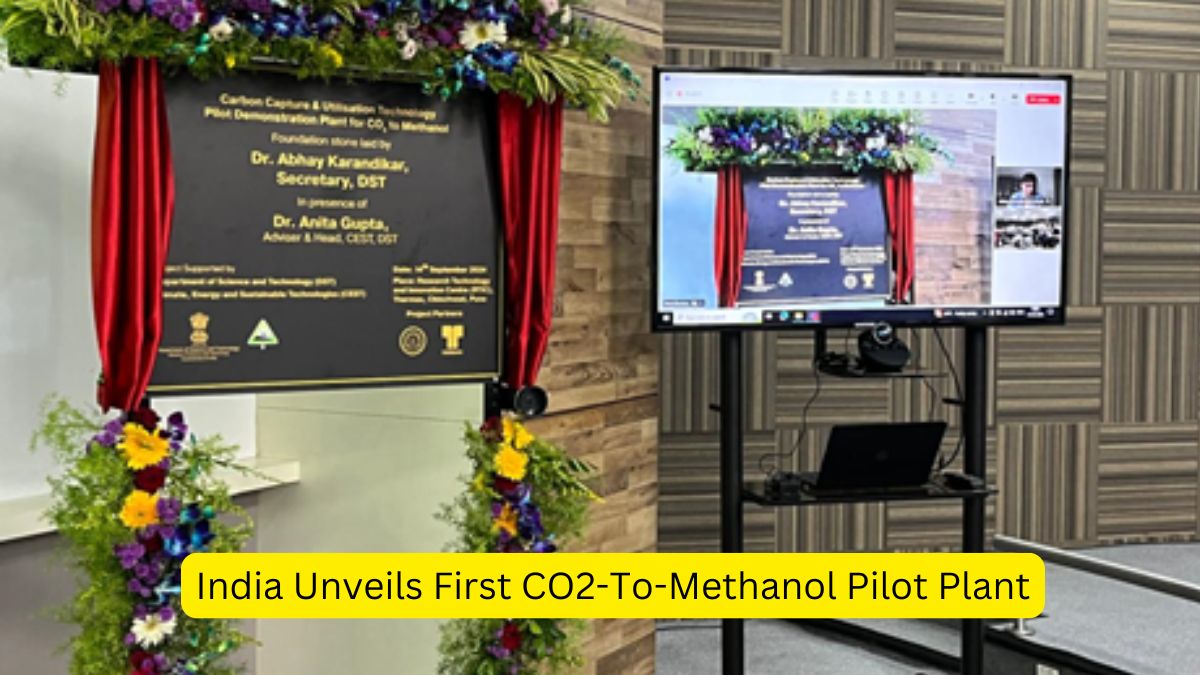The foundation stone for India’s first of its kind CO2-to-Methanol pilot plant with an overall capacity of 1.4 Tons Per Day (TPD) was unveiled virtually by Prof. Abhay Karandikar, Secretary, Department of Science and Technology (DST), Government of India, at Thermax Limited premises in Pune, Maharashtra.
Aim
To demonstrate CO2 capture and utilization (CCU) technologies, playing a crucial role in India’s journey towards achieving net-zero carbon emissions.
About Plant
Partners
The Indian Institute of Technology Delhi (IIT Delhi) and Thermax Ltd. will collaborate to develop the CCU technology.
Design
The plant with an overall capacity of 1.4 Tons Per Day (TPD) has been designed considering CO2 emissions from a diverse range of sources, including power plants, cement and steel plants, fertilizer plants, and refineries.
R&D (Research and Development)
A team of faculty members from the Department of Chemical Engineering at IIT Delhi will carry out the project-aligned R&D work, complementing the pilot plant activities and engaging in R&D for future developments.
Source of CO2 for capturing
- Syngas produced during coal gasification
- Flue gas from the combustion of carbonaceous fuels, and subsequently convert it to methanol.
Objective
- The project is anticipated to serve as a design template for many industrial applications, building capacity and preparing indigenous manufacturers to meet future demands for catalysts, absorbents, solvents, and other technology solutions at a commercial scale.
Funding of Project
- This pioneering project, supported by DST, Ministry of Science and Technology, Government of India is to be implemented in collaboration with the Indian Institute of Technology (IIT) Delhi and Thermax Limited, Pune.
- This project will be under Public-Private Partnership (PPP) mode.
- With an overall cost of approx, Rs. 31 crore.
Significance
- This initiative also aligns with India’s goals of energy self-reliance (Atmanirbhar Bharat) and sustainable development (Viksit Bharat).
- Additionally, NITI Aayog, in partnership with the Ministry of Petroleum, is developing policies for 15% methanol-blended diesel to reduce crude oil imports.
- The findings from the pilot plant could lead to scaling up CO2-to-methanol conversion technologies, aiding in the decarbonization of the coal-based thermal power sector, which contributes to 30% of India’s emissions.
What is CCUS?
- CCUS (Carbon Capture, Utilization and Storage) involves the capture of CO2, generally from large point sources like power generation or industrial facilities that use either fossil fuels or biomass as fuel.
- If not being used on-site, the captured CO2 is compressed and transported by pipeline, ship, rail or truck to be used in a range of applications, or injected into deep geological formations such as depleted oil and gas reservoirs or saline aquifers.




 Shashi Tharoor Conferred Honorary D.Litt...
Shashi Tharoor Conferred Honorary D.Litt...
 Meet The One of the Largest Raptors on E...
Meet The One of the Largest Raptors on E...
 Indian Mountaineer Aritra Roy Conquers M...
Indian Mountaineer Aritra Roy Conquers M...








